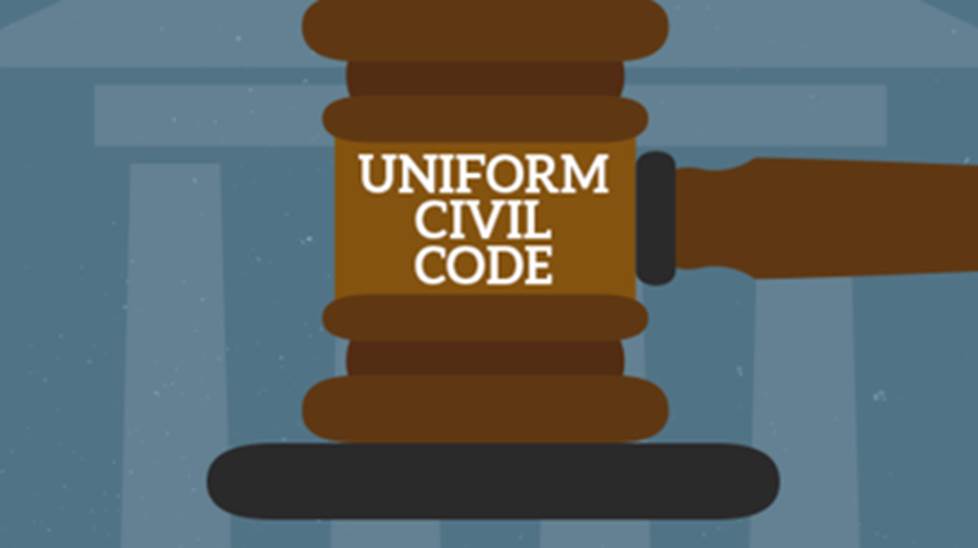

And What is a Uniform Civil Code? Who Defines It?
By Dr Aslam Abdullah
CA

India's ruling Hindu nationalist party, the BJP, with an eye on the 2024 national elections, intends to introduce a uniform civil code as a rallying point in a country with 3,000 castes and 25,000 sub-castes, hundreds of variations of religions, more than 60 languages, and millions of customs. What is a uniform civil code? No one knows, not even its proponents.
A civil code refers to laws relating to contracts, property, family, and obligations. Commonly, a state. In its articles
36-51, the Constitution of India refers to the desirability of a uniform civil code as long as it does not violate the fundamental rights guaranteed in Articles 12 to 35.
The Constitution refers to seven fundamental rights – the right to equality, the right to freedom, the right against exploitation, the right to freedom of religion, cultural and educational rights, the property right, and the right to constitutional remedies.
The difference between the two is that Fundamental Rights are justifiable, whereas directive principles are nonjusticiable. Courts cannot enforce the directive principles.
The source of the Directive Principles of State Policy (DPSP) is the Spanish Constitution, from which it came in the Irish Constitution.
Part IV of the Constitution of India (Article 36–51) contains the Directive Principles of State Policy (DPSP).
These principles aim to ensure the people's socioeconomic justice and establish India as a Welfare State.
DPSP consists of all the ideals the State should follow and keep in mind while formulating policies and enacting laws for the country.
These Articles intend to ensure social, economic, and political justice by minimizing inequalities in income and the right to an adequate means of livelihood for all citizens. They include the right to work, education, and public assistance in unemployment cases. They refer to securing just and humane work conditions, living wages, a standard of life, and good nutrition. They talk about prohibiting the slaughter of cows, calves, and other milch drought cattle.
They intend to promote the educational and economic interests of the weaker sections, particularly that of the Scheduled Castes (SCs), Scheduled Tribes (STs), and other weaker sections.
Article 44 talks about securing for the citizens a Uniform Civil Code throughout the territory of India.
Article 44: The State shall endeavor to secure for the citizen a Uniform Civil Code through the territory of India.
It is this directive principle that the ruling party wants to make an election issue, ignoring all other directives referring to health, education, status, income, and inequalities.
What is the purpose? How the Hindu nationalist party defines a uniform civil code. Will unspecified civil code nullify unamendable fundamental rights? Above all, who will benefit from its adoption?
India's diversity includes traditions, rituals, and customs followed by castes, religions, and cultural groups. For instance, among those identified Hindus are people who bury their dead and those who burn them.
Or there are strict caste rules in marriages. Will the uniform civil code permit Indians to have a non-caste-based choice marriage? Or will it ask Jains to prohibit widows from inheriting wealth? Will it stop polyandry (marriage of a woman to two or more men simultaneously), which is reasonably common among several tribes, such as the Gallongs of Arunachal Pradesh? Will it stop the Bhils from practicing polygyny (marriage in which two or more women share a husband)?
Every religious community in India has its customs, laws, and tradition. Within each community, groups have countless interpretations. The idea of a uniform civil code is divisive, especially in a country that still believes in God-created human hierarchy and refuses to acknowledge in practice that all have a right to a dignified existence.
India has allowed its daughters to be killed in infancy because of their gender, burned in the name of dowry, lynched for marrying out of their castes, or even walking in the localities of higher castes. The unknown and unspecified uniform civil code will only empower the hatemongers who believe in the superiority of their code of life. India's culture is defined mainly by the Hindu upper castes.
(Dr Aslam Abdullah is a resident scholar at Islamicity.org and editor-in-chief of the Muslim Observer newspaper. He is also the Indian Islamic Heritage Project director of the American Federation of Muslims of Indian origin and the interim President of the World Council of Muslims for Interfaith Relations, WCMIR.)

